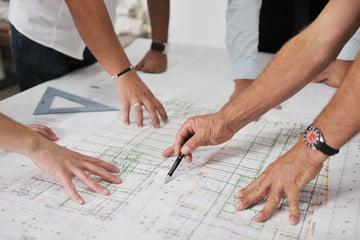Good design is good business. Former IBM CEO Thomas J. Watson believed that to be the case back in 1973 and the idea still rings true today. Good design has become a decisive advantage in countless industries.
When it comes to designing your build to suit project, there should always be the right form and functionality to meet your needs.
The design phase of the build to suit process should be collaborative between the tenant, architects, engineers, consultants, and the commercial developer. This results in a customized design specifically tailored to the tenant's specifications.
Let’s take a look at 4 questions you should always be asking when designing your build to suit project.

Is the design universal?
If you’re a growing retailer, you’re likely eyeing a number of locations and probably a number of areas, site variations, etc. So, the important question to ask is: will my concept transfer from one part of the country, or from one site layout to another?
While the objective of an expansion is to find the right site for your business, you also don’t want to limit yourself by making your design too complicated and overly restrictive.
Is the design functional?
You’ll want to ensure that your requirements are specific enough to meet your brand’s goals, but that they don’t sacrifice practicality and efficiency.
Your design should incorporate an efficient functional layout that uses systems to reduce costs while providing the best possible experience.
One of the biggest advantages of build to suit development is that it allows for maximum efficiency for the tenant. Make sure your design maximizes that efficiency through functionality.
 Can your design meet changing standards?
Can your design meet changing standards?
In many cases, municipal design standards are constantly changing and evolving. Design approval now focuses more on creating pedestrian and eco-friendly developments with a modern design look.
From off-site improvements to the general architectural design, your build to suit project may likely be under greater scrutiny from the municipality and the public. You will have to ensure your overall blueprint is adaptable and modifiable for these conditions.
Does the design provide visual communication?
No, your building doesn’t need to be a masterful piece of art but build to suit projects allow you to visually communicate who you are with your customers and the general public. With that in mind, your project should effectively represent you, your brand, and what you want to mean to consumers.
Creating a unique build to suit design is one of the most vital ways brands can maximize space and efficiency while reducing long-term costs and developing a tailored identity.
One of the keys to achieve the right results is finding a commercial real estate developer that can adjust to meet site-specific challenges, adapt to meet regional and locational requirements, while providing a personalized approach to that meets your budget and requirements.







